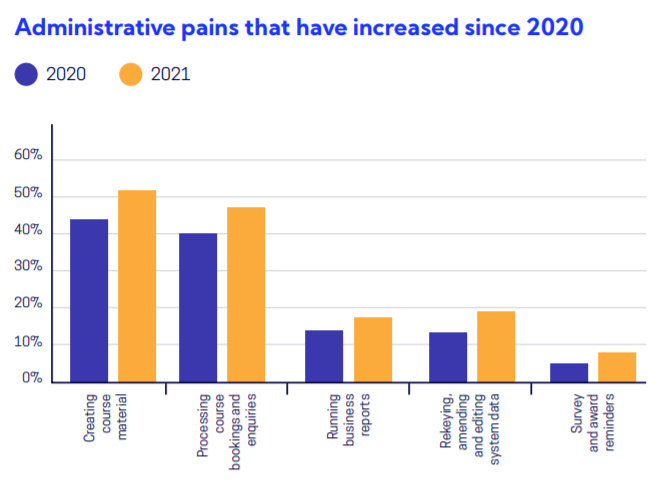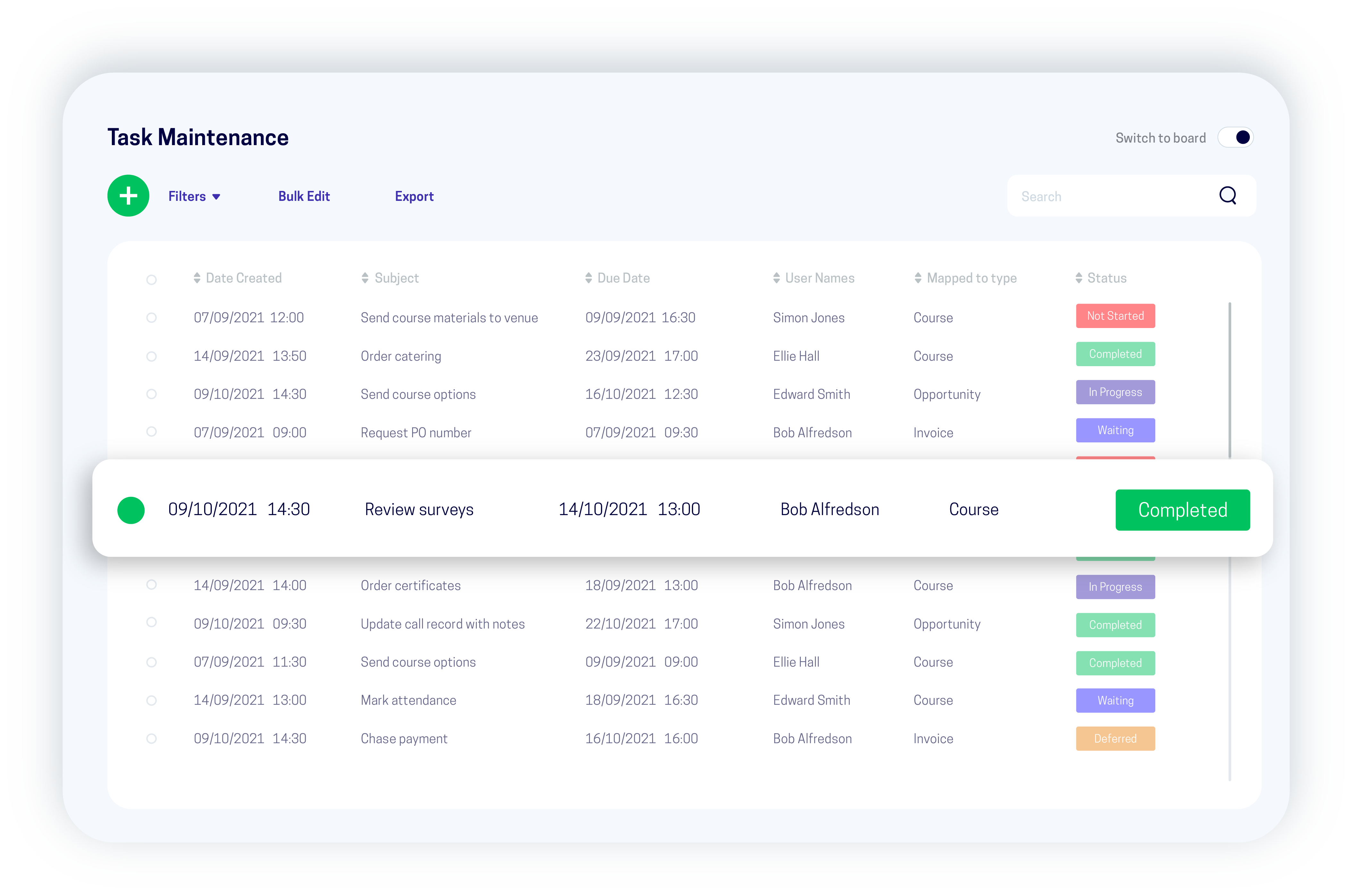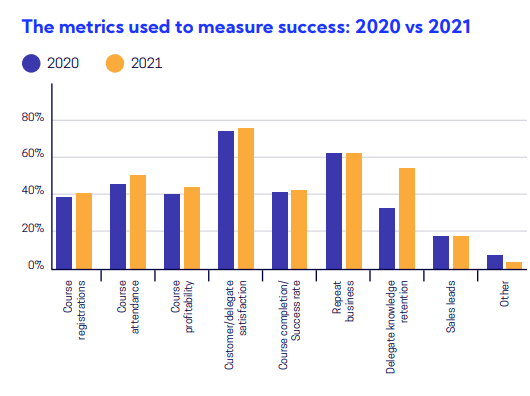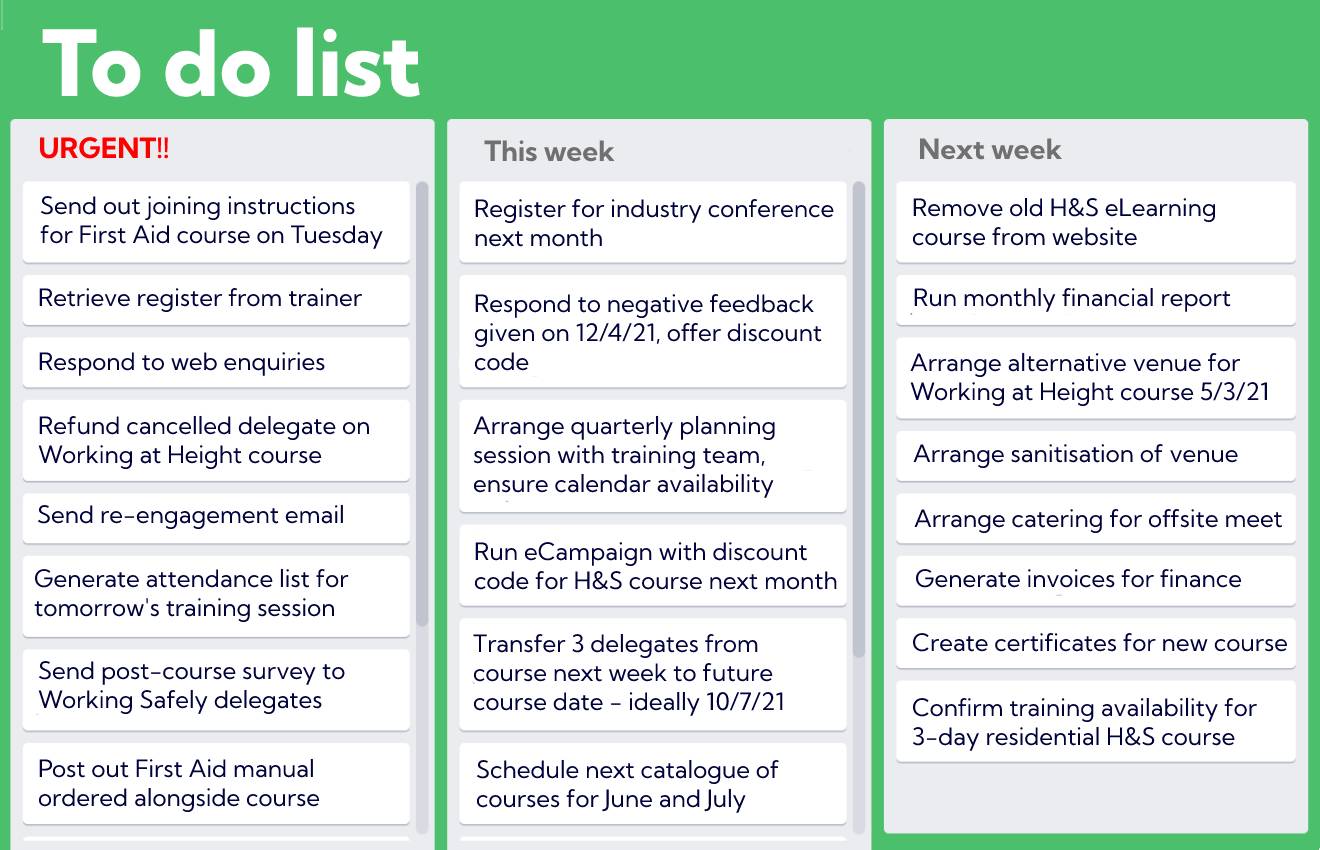Task management for training providers: The good, the bad and the ugly
.jpg)
Training management can quickly become an operational nightmare without the right tools in place to help.
While it's not uncommon for training departments to operate with some level of 'organised chaos' - it's important we recognise when this becomes a problem, and how it can in turn impact customer service, employee morale and ultimately, growth.
For many training providers, the organisation and management of training is a team-wide effort; there's often many moving parts and a number of people and processes involved to ensure everything goes off without a hitch.
Long gone are the days where sticky notes, blanket emails, verbal reminders and voicemails would suffice as tools to help stay on top of tasks. Now, our customers and colleagues demand a solution that's slicker and more predictable, one which is reliant on technology.
What's the significance?
In accessplanit's 2021 Training Industry Benchmark Report, training professionals reported administrative pains to be increasing across the board; creating course material and processing course bookings proving to be two of the most time consuming tasks for training providers. On top of this, training professionals mentioned a bucket-load of other tasks that dominate their day to day, from generating reports to arranging trainers and venues, and from running eCampaigns to scheduling new courses.

In fact, the vast majority of a training professionals day is spent on time-pressured, administrative to-do's; often spinning multiple plates at once in order to make ends meet.
The real problem arises when the rate of company growth is not matched by a rate of digital change. If tasks start slipping through the cracks, this can often lead to:
- Declining customer service and poor post-course feedback
- Internal disputes and conflict
- Weakened partnerships
Here we explore the good, the bad and the ugly of task management, and discuss how training providers can become more efficient using automation tools and technology.
Task Management: The ugly (read: archaic)
How can task management be described as ugly, I hear you ask.
Well, the way in which we manage tasks, both individually and as an organisation, has progressed a great deal over the past 10-20 years. Those training departments that find themselves with mis-alignment, internal disputes and chaos, typically share a common challenge - they are behind the times with their technology they are using.
Do any of these outdated task management techniques sound familiar in your training business?
- Using sticky notes or scraps of paper to act as reminders
- Verbally asking colleagues to 'pass on a message'
- Blanket emails asking someone in *team* to complete a task
- Using an excel spreadsheet with endless tabs

The upshot
Ultimately, for a business to survive, tasks need completing. By any means necessary.
So, for a training business that is a little behind the times with their technology, what is the solution?
Usually, it's to hire more back-office staff. And many training providers do just that. However, an unfortunate truth we must accept with task management is that humans are fallible. Regardless of how many staff we employ, mistakes will be made, and this will impact business reputation and training delivery. Furthermore, by adding more staff, we are simply adding the chaos that already exists - instead of 10 uncoordinated admins, we now have 20. This leads to further misalignment, frustration and chaos.
If we're serious about growth, this is not a viable solution.
Other complications can arise when 'too many cooks' are involved. It can lead to multiple staff dealing with a single task, leading to inconsistency for the customer and delays due to lack of ownership.
For a training business to be competitive in 2022, it's time to accept that technology is an investment worth it's weight.
Task Management: The bad
So, what does 'bad' task management look like?
Well, it's a step up from ugly, but it's still not quite there. Many training providers find themselves operating somewhere within this category.
On the whole, tasks are getting done, albeit sometimes with a delay. There's some level of ownership and accountability, however, it still feels like disorganised chaos.
Most training departments recognise the merit of having organisational tools in place, however rarely are these collaborative in nature. Common examples of this are personal Trello boards or a virtual sticky notes. This may extend as far as shared Teams or Slack channels for larger teams.
Does the below look familiar?
Across a team, the use of Customer Relationship Management (CRM) tools can help to organise and automate tasks at an account and user level, but often fall short when it comes to course-related communications - such as booking confirmations, course feedback and trainer notifications.
The upshot
Disparate systems and solo tools are at least a paltry stride ahead of no systems at all - but there's still a long way to go before this becomes an appropriate and scalable solution for a busy training business. The cost to the organisation of not having the right technology in place can still be significant.
Training providers stuck with 'bad' task management still face the challenge of misalignment. They have their own day(s) organised, but across the team there is inconsistency that is still being passed on to the customer. This is only amplified if there are multiple administrators and coordinators working together, or operating a job share.
Common gaps within task management when working with personal calendars include:
- A lack of visibility across the team, particularly for managers
- No accountability due to no ownership of tasks
- No deadlines or alerts
- No cross-team prioritisation or collaboration
- Trainers out of the loop
Task Management: The good
There are a select few training departments that run like a well oiled machine. It's naïve to think it's always the largest and richest of training businesses that fall in to this category - often they can actually be the most disorganised!
So what does the crème de la crème of task management look like?
At the very heart of organised task management is automation; taking the pressure off your team by investing in tools that allow you to work collaboratively, with reminders and prioritisations in real time. A documented, pre-defined process determines what happens and when, and who's accountable for ensuring the delivery.
Here's what it takes to reach this stage:
- A centralised platform that is accessed by all necessary stakeholders
- Workflow actions that are tied to objects, such as bookings, accounts, users and courses
- Prioritisation of tasks and timescales for completion
- Cloud-based software
- Audit logs and levels of accountability
- Changes happen in real time
Training management software allows you to set up triggers based around any object in the platform, allowing communications and tasks to be created automatically. Here are some great examples of how task management can be automated through accessplanit's training management software.
Scenario 1
'Delegate A' books on to an open course on a training providers website, using the online booking functionality. The course takes place in 3 days time, therefore it's important information about the course is delivered quickly. Following payment, communications have already arrived in the delegate's inbox confirming payment and explaining where to go on the day, mail merging key venue information and delegate data from accessplanit's platform. A task has automatically been created for 'Administrator A' to increase the catering order, with the priority set as urgent. 'Trainer A' has received a notification to ensure the current venue has enough spaces, and to update the register for the day.
Scenario 2
'Administrator A' at ABC training schedules a new Health & Safety course to take place in a month's time. As soon as the course has been created, an email has already been sent to 'Trainer A' to confirm his availability for the session. A separate task has been created for 'Administrator B' to print off course handouts for the day, due in 3 week's time. A task has also automatically been created for 'Trainer A' to sanitise the venue and ensure COVID protocol is planned, due the day before the course.
If 'Trainer A' is unable to teach this course, the associated tasks can automatically be assigned to 'Trainer B' following a confirmation.

The upshot
So, what's the significance? Is it worth investing in collaborative automation tools for task management?
Without question.
Task management, when done well, not only provides a huge competitive advantage, but it makes your team much more productive and collaborative. In our annual Training Industry Benchmark Report, 'customer and delegate satisfaction' was the number one measure of success, closely followed by 'repeat business.'
The customer experience runs right through from first contact to post-course follow up. Many things contribute to a great customer experience, but a key part of this is consistency, professionalism and speed of service, all of which is impacted by a company that is on top of task management.

Takeaways
The frustrations and headaches of task management in year's past have been eased thanks to technology that allows us to automate much of what once troubled us, reducing chaos, and providing timely reminders for to-do's requiring our attention.
Automated technology has quickly gone from being a 'nice-to-have' to a requirement for any training business hoping to remain competitive in 2022. Ultimately, effective task management has the potential to increase customer satisfaction, internal collaboration, transparency and security.
Interested to learn how training management software can help your training business stay on top of training admin? Book a demo with accessplanit today!


